

United Artists
Cast: Jean Hersholt (Judson), Phyllis Haver (Marie Skinner), Don
Alvarado (BabeWinsor), Belle Bennett (Mrs. Judson), Sally O'Neil
(Ruth Judson, the daughter), William Bakewell (the son)
Judson is a rich businessman. When Marie, a golddigger,
overhears that he has just made $250,000 on one business deal,
she determines to pursue him. With the help of her boyfriend,
Babe, she moves into Judson's apartment building to plan her seduction.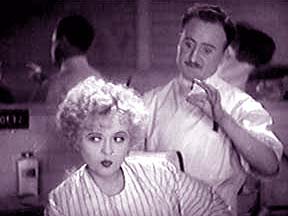
Judson is a devoted family man with two older children. However, he soon falls prey to Marie's scheme and the two of them are going out almost every night. Judson tells his family he is working late, a pretense that works well until the mother, the two children and a friend go out to a nightclub one evening and see Marie and Judson.
When confronted later, Judson tells his wife he has a right to live in his own way and moves into another apartment. Mother is distraught to the point of suicide and is saved from jumping off the top of the building by Ruth, the daughter. Following this incident, Ruth sees a headline in a newspaper, "Son Shoots Mother's Paramour." This inspires her to get her father's gun and go after Marie.
By 1928 when "The Battle of the Sexes" was made, D.W. Griffith was no longer regarded as the grand master he had been ten years earlier. He had had a falling out with United Artists, the company he helped found, around 1924 and signed with Adolph Zukor at Paramount. In the meantime, however, Joe Schenck came into power at United Artists and was eager to engage Griffith's talent. Although signed as just another salaried director, Schenck's terms were generous, and the admiration between the two men was mutual.
His first feature under the new contract, "Drums of Love" (1928) was moderately successful, however, his next, "The Battle of the Sexes," did not fare as well.
Griffith had originally made "The Battle of the Sexes" in 1914 with Lillian Gish and Owen Moore in the leads. It is supposed that Schenck pressed Griffith to do a remake of his earlier success, although it wouldn't be hard to believe the director was not opposed to the idea if only from a sentimental aspect, as well as his familiarity with the story.
Based on the films of 1928 that are available for viewing
today, it is difficult to understand why "The Battle of the
Sexes" was not more of a success. Photoplay called
it a "light-heavyweight drama" but added that it was
"worthwhile." Welford Beaton in The Film Spectator
said, "I think it is the best picture he (Griffith) has ever
made." Louella Parsons said it was "a popular success,"
and Film Daily said, "Griffith's reputation as a box-office
director can stand more like this one." There were conflicting
opinions. The Herald-Tribune called 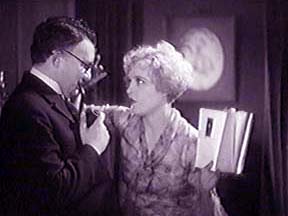 it a "third-rate
sex drama." Variety warned that attendees "are
slated for disappointment, almost shock."
it a "third-rate
sex drama." Variety warned that attendees "are
slated for disappointment, almost shock."
So what happened? First of all, "The Battle of the Sexes" is an overall good film - that should be established. It is stylish, stirs the viewer, and has a superb cast who instill life into their characters. Nevertheless, Griffith historian Richard Schickel may have come closest to summing up the overall shortcomings of the film when he said the film "teeters sometimes on the brink of farce, sometimes on the brink of tragedy, but only rarely evokes any emotion but discomfort."
With that being said, the fault of the film lies not in the enjoyment while you're watching it, but the feeling you walk away with after having watched it. The word "discomfort" somehow fits. To partially explain this, we must look at our central character, Judson, who is expertly portrayed by Jean Hersholt.
Our introduction to the Judsons is meant to paint a portrait of the ideal family - a loving father and mother, two adorable children (who in this case must be in their late teens), and a picture-perfect home that is filled with love and devotion. This image is portrayed by way of the mother's birthday. There is a table full of presents. The children are so excited they are beside themselves. Father is to arrive home soon, and the anticipation is almost too much to bear. Finally, father does come home, and, of course, he has the present that brings tears of joy from the mother and expressions of amazement from the children. All is well in the Judson household.
The first ominous tone is rung at the dinner table that evening. Prior to blowing out the candles on her birthday cake, Mother says, "I wish that life would go on like this forever." When she fails to blow out all the candles on the first attempt, daughter Ruth says, "Ah! Gee! Mumsy, you lose your wish!" This, along with scenes of Marie moving into an apartment down the hall to begin her seduction of Judson, sets the tone for what is ahead.
With such a picture of the model family, it is somewhat
puzzling that Judson succumbs to Marie's charms so easily and
quickly. As he is walking down the hall, Marie runs out of her
apartment to escape a mouse. Judson goes in to chase the mouse
away. Marie feigns a fainting spell, and, of course, the obligatory
close, seductive exercise takes place on the sofa as he attempts
to awaken her. Later we see him return to her apartment as she
apologizes for calling him so often. From that point, they begin
going out together as Judson tells his family he is working late
in the evenings.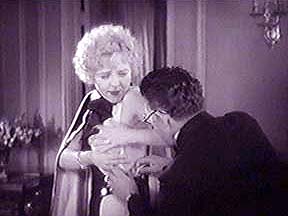
In a later scene, the mother and two children see their father at a nightclub carrying on very foolishly with Marie. When he is confronted by a distraught wife afterwards, he is unrepentant and instead declares, "I feel I have the right to live in my own way. . ."
The viewer's emotions are somewhat at odds with each other where Judson is concerned. He is our central character, yet he is not a likeable character. Griffith shows us scenes of a wife and mother distraught to the point of suicide. We see two children who are horrified at the prospect of their happy home being destroyed. Certainly there is tragedy here. How are we supposed to feel about the this man who has caused this tragedy? Even though he has some comical moments in the film, he fails to elicit any sympathy. For example, we are given a rather lengthy, humorous segment where he is exercising as he prepares himself to go out with Marie, even to the point of putting on a corset. Knowing the motive behind all this, does it dampen the humor of this sequence?
And what about Marie? She is certainly vivacious, cute, even comical, but, still she is a callous golddigger whose intention is to bilk this man of his money even at the expense of destroying his home. Schickel made a good point when he said we rarely experience any emotion other than "discomfort."
Admittedly, Griffith has given us a slice of life that, no doubt, happens every day. Still, we have no character in the film who qualifies as the "hero/heroine" of our story. Actually, Marie seems the most likely candidate. Would it have been too unrealistic or cliché if Marie had developed such a liking for Judson that she couldn't bring herself to blackmail him and called the whole thing off? Just because Judson is repentent at the end doesn't make everything right for the viewer. The only reason he went back to his wife was because he realized Marie's motives. Maybe if he had come to his senses and gone back to his wife while still believing Marie cared for him - would we have sympathized with our central character more?
As noted before, "The Battle of the Sexes" is
a good film, and most of this credit goes not to Griffith, but
to the actors who were chosen for this film. Hersholt is perfect
in the role he was given. He moves from dignified businessman
to loving father to a ridiculous old man 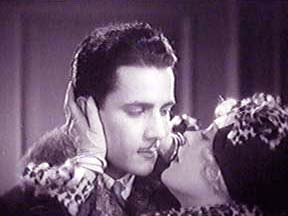 foolishly grinning
at the charms of a much younger woman very well.
foolishly grinning
at the charms of a much younger woman very well.
Phyllis Haver gets top acting honors in this film. She is the perfect flapper and has many moments in the movie that stand out. She is hilarious in the scene where Judson rescues her from the mouse - rushing wildly into the hallway and almost knocking him down, jumping up on the sofa table to evade the rodent scurrying about her floor, lying on the sofa and looking seductive and pitiful at the same time. In the scene where Ruth points a gun at Marie and threatens to kill her, Haver's performance is superb. She moves back and forth in horror, bangs her fist on the table as she pleads for her life, ducks down low and covers her eyes. Then, when she takes the gun from Ruth, she conveys anger while still trembling with fright, all blended perfectly. Finally, when she catches Babe trying to make love to Ruth, she is the fiery tempered siren who chases him around the room ranting and raving at his unfaithfulness. Then when he draws his fist back to hit her, she quickly becomes the victim. How could he do such a thing after all she's done for him? In a word, Haver is magnificent.
Don Alvarado deserves credit, too. In one humorous title, Marie refers to him as "perfumed ice," and he personifies this description well. In one scene, rather racy for 1928, Marie kisses him on the mouth and then the neck, nibbles his ear and then finishes with a long, slow kiss full on the mouth. Babe (Alvarado) stands there through it all, unaroused. When she finishes, he nonchalantly puts on his derby and swaggers, unruffled, cane in hand, out the door. The portrayal of the ladies' man who loves no one more than himself and obviously has an infinite ego, is ably handled by Alvarado.
Sally O'Neil, as the daughter, Ruth, is likeable and does a capable job, but she is almost a caricature. Her excitement at the birthday party is to the point of excess. She acts if she is about to burst with her eyes fairly popping out of the sockets. William Bakewell, as the brother, is equally over-animated. From his expressions, one wonders if he is going to convulse at any moment.
Belle Bennett, as the mother, provides us with an intense
portrayal, as well. It is certainly not restrained acting, but,
then again, what is appropriate for the emotional distress her
character experiences in this movie? The New York Times
reviewer said she is "too much the film mother instead of
a human being."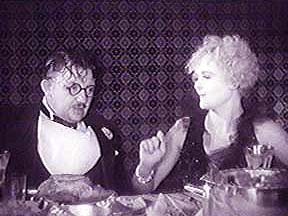
Although Griffith made several films much better than this, it is not an unworthy effort for him. There are some fine Griffith touches. One of the most poignant is in the nightclub scene. As the evening wears on, Judson finds it difficult to keep up with this young woman. Babe comes along and asks to have a dance with Marie. Judson is only too happy to consent so that he may take a rest. As the scene closes, we are given a long shot of Judson sitting in the corner, sweating, arm resting on the table, looking down, hair disheveled and hanging over his forehead. Here is a portrait of a foolish old man, alone and very much out of place. The scene irises out. The touching, subtle message conveyed visually, without any accompanying titles, is what Griffith was so good at.
Mention should be made, too, of the titles which were written by Gerrit Lloyd. They are quite often humorous and quite in keeping with the times, not a "throw-back" to the original 1914 release. For example, Marie, in admiration of his information-gathering on Judson, tells Babe, "I gotta hand it to you - you're handsomer than the front of a bank." He is introduced earlier with a title, "Babe Winsor - the wrong answer to a maiden's prayer." Then there's a suggestive title when Marie models her bathing suit for Judson. She lies on her back on the floor moving her arms in a swimming motion and asks, "Do you think I can get anywhere with a stroke like this?"
Silent film historian William K. Everson said the film had "sparkle and life" and was "vivacious," although it was his opinion that it was "beneath Griffith's dignity." If the viewer is looking for a "Birth of a Nation," a "Broken Blossoms" or an "Orphans of the Storm," it will not be found here. If that's what is meant by "beneath Griffith's dignity," then is may be true. However, "The Battle of the Sexes" was designed from the outset for commercial appeal, and considered in the context of the films we have available from that period today, it is a very good, although admittedly not great, movie.
The film was originally issued with a synchronized score with which Griffith was reportedly not pleased. Unfortunately, this score has been lost, although the DVD release includes a superb score by the Mont Alto Motion Picture Orchestra. As an added attraction, the DVD also has a supplementary menu that allows immediate access to various parts of the score. The picture quality is excellent having been made from the original camera negative.
copyright 2002 by Tim Lussier,
all rights reserved